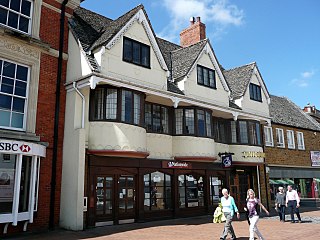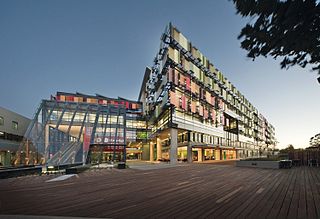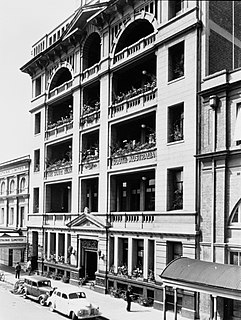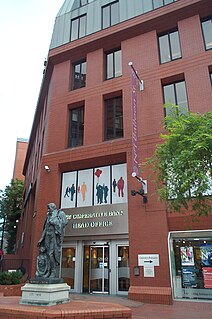Related Research Articles

A building society is a financial institution owned by its members as a mutual organization. Building societies offer banking and related financial services, especially savings and mortgage lending. Building societies exist in the United Kingdom, Australia and New Zealand, and used to exist in Ireland and several Commonwealth countries. They are similar to credit unions in organisation, though few enforce a common bond. However, rather than promoting thrift and offering unsecured and business loans, the purpose of a building society is to provide home mortgages to members. Borrowers and depositors are society members, setting policy and appointing directors on a one-member, one-vote basis. Building societies often provide other retail banking services, such as current accounts, credit cards and personal loans. The term "building society" first arose in the 19th century in Great Britain from cooperative savings groups.

The National Bank of New Zealand Limited (NBNZ), often referred to as The National Bank, was one of New Zealand's largest banks. Throughout much of its history, the National Bank provided commercial banking services to mainly major industrial and rural as well as some personal customers.

Bendigo and Adelaide Bank is an Australian financial institution, operating primarily in retail banking. The company was formed by the merger of Bendigo Bank and Adelaide Bank in November 2007.

The Bank of Queensland is an Australian retail bank with headquarters in Brisbane, Queensland. The bank is one of the oldest financial institutions in Queensland, having begun as a building society, It now has 160 branches throughout Australia, including 65 corporate branches and 95 "owner managed" branches.

Bank of New Zealand (BNZ) is one of New Zealand's big four banks and has been operating in the country since the first office was opened in Auckland in October 1861 followed shortly after by the first branch in Dunedin in December 1861. The bank operates a variety of financial services covering retail, business and institutional banking and employs over 5,000 people in New Zealand. In 1992 the bank was purchased by the National Australia Bank and has since then operated as a subsidiary, but it retains local governance with a New Zealand board of directors.
St.George Bank is an Australian bank with its headquarters in Sydney. Since a 2008 merger, the bank has been part of Westpac, having previously been an independent legal entity. In 2010, St.George was deregistered as a company and ceased to be a standalone authorised deposit-taking institution.

The State Bank of South Australia was a bank created in 1896 and owned by the Government of South Australia. The bank became the subject of a two-year South Australian Royal Commission upon collapse in 1991. The surviving part of the bank now exists as BankSA.
Suncorp Group Limited is an Australian finance, insurance, and banking corporation based in Brisbane, Queensland, Australia. It is one of Australia's mid-size banks and its largest general insurance group, formed on 1 December 1996 by the merger of Suncorp, Metway Bank and the Queensland Industry Development Corporation (QIDC).
The Advance Bank was an Australian bank that existed from 1985 until 1997, when it merged with St George Bank. It is not related to Advance Bank AG of Germany.

Cooperative banking is retail and commercial banking organized on a cooperative basis. Cooperative banking institutions take deposits and lend money in most parts of the world.
The Adelaide Bank was a publicly listed bank with its head office in Adelaide, South Australia. It was established on 1 January 1994 from the Co-operative Building Society of South Australia Limited, which was Australia's largest building society as a result of a merger with the Hindmarsh Building Society. On 9 August 2007 it merged with Bendigo Bank to form Bendigo and Adelaide Bank Limited, and Adelaide Bank shares ceased to be quoted on the top 100 ASX that companys with more than 110,000 shareholders. Since 2008 the new entity has been known as the Bendigo and Adelaide Bank.
The Savings Bank of South Australia was founded in 1848, trading from a single room in Gawler Place, Adelaide. In 1984 it merged with the State Bank of South Australia, with the merged entity taking the latter name. The Bank of South Australia is now a division and a trading name of St.George Bank, which is now a subsidiary of Westpac.
Bank of Scotland International Limited was the international banking division of Bank of Scotland. Established in 2003, it was headquartered in Jersey, Channel Islands and operated branches in the Isle of Man and Hong Kong, until merging with Lloyds TSB Offshore in 2011, under the Lloyds TSB International brand.
Countrywide Banking Corporation limited was a retail bank operating throughout New Zealand until 1998 when it was acquired by the National Bank of New Zealand. It was created from Countrywide Building Society, which itself emerged from the original Auckland Co-operative Terminating Building Society created in March 1897.
Guinness Mahon was an Irish merchant bank originally based in Dublin but more recently with operations in London.

Co-op Insurance is the trading name of CIS General Insurance, a general insurance company, which is part of the Co-operative Group, based in Manchester, United Kingdom. Co-op Insurance Services, an insurance intermediary incorporated in 2017, is a wholly owned subsidiary of CIS General Insurance.
Co-operative Bank or Cooperative Bank may refer to:
Heartland Bank is a New Zealand owned bank that was created in 2011 through the merging of four financial organisations. Heartland was granted its bank registration by the Reserve Bank of New Zealand in 2012. It specialises in motor vehicle loans, reverse mortgages, small business finance, livestock finance, savings, investments and deposits.
Hume Bank is an Australian bank. Headquartered in Albury, New South Wales, it is a customer-owned bank that started as a building society in 1955. Its business focus is on retail banking and assisting local economic development.
References
- ↑ Tripe, David. "Banking Supervision by Disclosure – a Review of the New Zealand Regime" (PDF). Massey University. Archived from the original (PDF) on 14 October 2008. Retrieved 2 January 2018.
- ↑ Talk To Ray White New Zealand
- 1 2 3 "Report of the Auditor-General on an Investigation into The State Bank of South Australia". Adelaide: Auditor General of South Australia. 16.2.2. Retrieved 10 July 2007.
- ↑ "List of registered banks in New Zealand – past and present". Wellington NZ: Reserve Bank of New Zealand. Retrieved 10 July 2007.